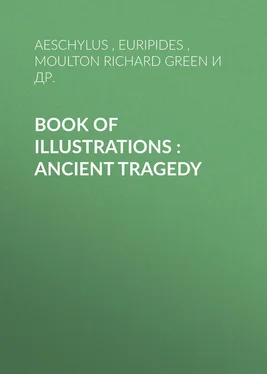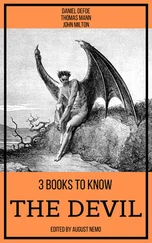Richard Moulton - Book of illustrations - Ancient Tragedy
Здесь есть возможность читать онлайн «Richard Moulton - Book of illustrations - Ancient Tragedy» — ознакомительный отрывок электронной книги совершенно бесплатно, а после прочтения отрывка купить полную версию. В некоторых случаях можно слушать аудио, скачать через торрент в формате fb2 и присутствует краткое содержание. Жанр: foreign_antique, foreign_prose, на английском языке. Описание произведения, (предисловие) а так же отзывы посетителей доступны на портале библиотеки ЛибКат.
- Название:Book of illustrations : Ancient Tragedy
- Автор:
- Жанр:
- Год:неизвестен
- ISBN:нет данных
- Рейтинг книги:5 / 5. Голосов: 1
-
Избранное:Добавить в избранное
- Отзывы:
-
Ваша оценка:
- 100
- 1
- 2
- 3
- 4
- 5
Book of illustrations : Ancient Tragedy: краткое содержание, описание и аннотация
Предлагаем к чтению аннотацию, описание, краткое содержание или предисловие (зависит от того, что написал сам автор книги «Book of illustrations : Ancient Tragedy»). Если вы не нашли необходимую информацию о книге — напишите в комментариях, мы постараемся отыскать её.
Book of illustrations : Ancient Tragedy — читать онлайн ознакомительный отрывок
Ниже представлен текст книги, разбитый по страницам. Система сохранения места последней прочитанной страницы, позволяет с удобством читать онлайн бесплатно книгу «Book of illustrations : Ancient Tragedy», без необходимости каждый раз заново искать на чём Вы остановились. Поставьте закладку, и сможете в любой момент перейти на страницу, на которой закончили чтение.
Интервал:
Закладка:
Strophe: during which the evolutions take a Right Hand direction.
The Chorus resume: though shut out from War their old age has still suasive power of song, and they can tell of the famous omen seen by the two kings and the whole army as they waited to embark: two eagles on the left devouring a pregnant hare:
Sing a strain of woe
But may the good prevail! {120}
Antistrophe: the same rhythm line for line as the Strophe, but the evolutions taking Left Hand direction.
and the Prophet Calchas interpreted; they shall lay Troy low, only beware lest the Victors suffer from the wrath of some God, Artemis who hates the eagle:
Sing a strain of woe,
But may the good prevail! {137}
Epode: a different rhythm, and the evolutions without any special direction.
May some Healer, Calchas added, avert her wrath, lest she send delays upon the impatient host and irritate them to some dread deed, some sacrifice of children to haunt the house for ever! So he prophesied in piercing strains.
Sing a strain of woe,
But may the good prevail {154}
With a change of rhythm, the Chorus pass into their first regular Choral Ode; Strophes and Antistrophes as in the Prelude, but the Evolutions now leading them from the central Altar to the extreme Right and Left of the Orchestra.
Strophe I: Evolutions leading Chorus from Thymele to extreme Right of Orchestra.
It must be Zeus – no other God will suffice – Zeus alone who shall lift from my 2 2 The Chorus generally speak of themselves in the Singular.
mind this cloud of anxiety;
Antistrophe I: Evolutions the same, rhythm for rhythm, as the Strophe, but leading the Chorus back from the Right of Orchestra to the central Altar.
For on Zeus, before whom all the elder Gods gave way, they must rely who are bent on getting all the wisdom of the wise. {168}
Strophe II: a change of rhythm: evolutions leading Chorus from the central Altar to the extreme Left of Orchestra.
Yes: Zeus leads men to wisdom by his fixed law that pain is gain; by instilling secret care in the heart, it may be in sleep, he forces the unwilling to yield to wiser thoughts: no doubt this anxiety is a gift of the Gods, whose might is irresistible. {176}
Antistrophe II: same rhythm, but evolutions leading back from Left of Orchestra to central Altar.
When Agamemnon, not repining, but tempering himself to the fate which smote him, waited amidst adverse winds and failing stores: {184}
Strophe III: fresh change of rhythm, Chorus moving to Right of Orchestra.
and the contrary winds kept sweeping down from the Strymon, and the host was being worn out with delays, and the prophet began to speak of 'one more charm against the wrath of Artemis, though a bitter one to the Chiefs,' {195}
Antistrophe III: same rhythm, movement back from Right of Orchestra to Altar.
at last the King spoke: great woe to disobey the prophet, great woe to slay my child! how shed a maiden's blood? yet how lose my expedition, my allies? May all be well in the end! {210}
Strophe IV: change of rhythm; movements to the left of Orchestra.
So when he himself had harnessed
To the yoke of Fate unbending,
With a blast of strange new feeling
Sweeping o'er his heart and spirit,
Aweless, godless and unholy,
He his thoughts and purpose altered
To full measure of all daring,
(Still base counsel's fatal frenzy,
Wretched primal source of evils,
Gives to mortal hearts strange boldness,)
And at last his heart be hardened
His own child to slay as victim,
Help in war that they were waging
To avenge a woman's frailty,
Victim for the good ship's safety. {219}
Antistrophe IV: back to Altar.
All her prayers and eager callings
On the tender name of Father,
All her young and maiden freshness,
They but set at naught, those rulers,
In their passion for the battle.
And her father gave commandment
To the servants of the Goddess,
When the prayer was o'er, to lift her,
Like a kid, above the altar,
In her garments wrapt, face downwards, —
Yea, to seize with all their courage,
And that o'er her lips of beauty
Should be set a watch to hinder
Words of curse against the houses,
With the gag's strength silence-working.
Strophe V: Altar to Sight of Orchestra.
And she upon the ground
Pouring rich folds of veil in saffron dyed,
Cast at each one of those who sacrificed
A piteous glance that pierced
Fair as a pictured form,
And wishing, – all in vain, —
To speak; for oftentimes
In those her father's hospitable halls
She sang, a maiden pure with chastest song,
And her dear father's life
That poured its threefold cup of praise to God,
Crowned with all choicest good,
She with a daughter's love
Was wont to celebrate. {238}
Antistrophe V: Back to Altar.
What then ensued mine eyes
Saw not, nor may I tell, but Calchas' arts
Were found not fruitless. Justice turns the scale
For those to whom through pain
At last comes wisdom's gain.
But for our future fate,
Since help for it is none,
Good-bye to it before it comes, and this
Has the same end as wailing premature;
For with to-morrow's dawn
It will come clear; may good luck crown our fate!
So prays the one true guard,
Nearest and dearest found,
Of this our Apian land. {248}
The Ritual on the Stage being now concluded, Clytaemnestra advances to the front. At the same moment the Choral Ode is finished and the Chorus take up their usual position during the Episodes, drawn up in two lilies in front of the Altar facing the Stage. They speak only by their Foreman (or Corypliceus), and use the ordinary Iambic Metre (equivalent to our Blank Verse).
The Foreman of the Chorus repeats his enquiries of Clytaemnestra as to the meaning of this sudden rejoicing, guardedly adding that it is his duty to pay respect to his lord's wife in his absence — Clytaemnestra announces that Troy has been taken this last night – rapid interchange of stichomuthic dialogue, the Chorus expressing their amazement as to how the news could travel so fast.
Cho. What herald could arrive with speed like this?
Clytaem. Hephiestos flashing forth bright flames from Ida:
Beacon to beacon from that courier-fire
Sent on its tidings; Ida to the rock
Hermaean named, in Lemnos: from the isle
The height of Athos, dear to Zeus, received
A third great torch of flame, and lifted up,
So as on high to skim the broad sea's back,
The stalwart fire rejoicing went its way;
The pine wood, like a sun, sent forth its light
Of golden radiance to Makistos' watch;
And he, with no delay, nor unawares
Conquered by sleep, performed his courier's part.
Far off the torch-light to Euripos' straits
Advancing, tells it to Messapion's guard:
They, in their turn, lit up and passed it on,
Kindling a pile of dry and aged heath.
Still strong and fresh the torch, not yet grown dim,
Leaping across Asôpos' plain in guise
Like a bright moon, towards Kithaeron's rock,
Roused the next station of the courier flame.
And that far-travelled light the sentries there
Refused not, burning more than all yet named:
And then the light swooped o'er Gorgôpis' lake,
And passing on to Aegiplanctos' mount,
Bade the bright fire's due order tarry not;
And they, enkindling boundless store, send on
A mighty beard of flame, and then it passed
The headland e'en that looks on Saron's gulf
Still blazing. On it swept, until it came
To Arachnaean heights, the watch-tower near;
Then here on the Atreidae's roof it swoops,
This light, of Ida's fire no doubtful heir.
Such is the order of my torch-race games;
One from another taking up the course,
But here the winner is both first and last;
And this sure proof and token now I tell thee,
Seeing that my lord hath sent it me from Troïa. {307}
Интервал:
Закладка:
Похожие книги на «Book of illustrations : Ancient Tragedy»
Представляем Вашему вниманию похожие книги на «Book of illustrations : Ancient Tragedy» списком для выбора. Мы отобрали схожую по названию и смыслу литературу в надежде предоставить читателям больше вариантов отыскать новые, интересные, ещё непрочитанные произведения.
Обсуждение, отзывы о книге «Book of illustrations : Ancient Tragedy» и просто собственные мнения читателей. Оставьте ваши комментарии, напишите, что Вы думаете о произведении, его смысле или главных героях. Укажите что конкретно понравилось, а что нет, и почему Вы так считаете.












